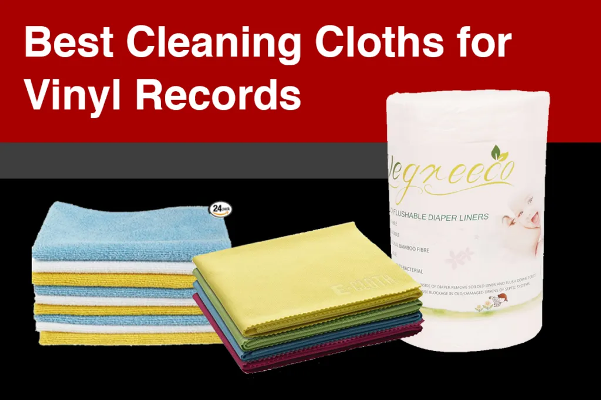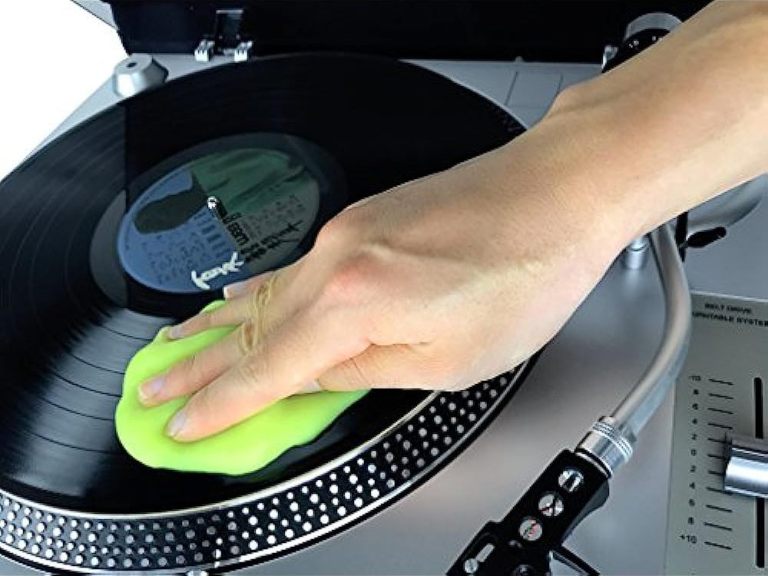There’s no one best way to clean your vinyl record. Lots of people just use microfiber cloths, but other people like using other things instead. Some think these methods work best while others don’t even believe in changing how they clean vinyl records at all.
These records might be old, but they’re still in high demand. And, who wants to risk sacrificing the quality of their vinyl anyway? Even if you have one bad experience with a cleaning method, it might be enough to make you distrustful of that technique. Some might even turn to the unorthodox but common wood glue cleaning method we discussed in our DIY record cleaning tutorial, all of which are detailed in the link below.
It’s hard to choose a favourite, so we don’t want to make any recommendations here. What we can do is tell you what people seem to think are some of the best gear out there and their advice for using it. We always recommend that you be careful with cleaning materials. Quality differs from company to company so always read the instructions and make sure they’re safe for your needs before trying them out.
Top Cleaning Cloths for Vinyl Records Review
1. Micro Fiber Cleaning Cloths
Lots of vinyl cleaners use microfiber cloths, such as the KAIU Vinyl Record Cleaner and the Big Fudge Record Care System. People often get them as a safe solution for cleaning all sorts of delicate things, like vinyl records. They work well on all sorts of jobs. Small spaces, hidden hard-to-reach spots and gaps are no problem for them due to their small structure – they can pick up dirt, dust and even gunk!
Proponents of microfibers often argue that this method of cleaning runs the risk of just re-depositing dirt back into the record as you wipe it. There are many complaints about how these methods also cause other particle-types such as dust and lint to collect over time which only end up being a source for damage.
This is where microfiber cleaners are different from other types of clothes. They need changing regularly and they also need to be washed separately. They should never go into the washing machine or dryer as that will cause them to accumulate lint. Some people have even gone through the trouble of picking out their own lint and claim there’s no harm done to their records.
For the most part, records should be just fine after 3 rounds of cleaning with lint and dirt left in the cloth or if you’re applying too much pressure. One downside though is that it can be difficult to find the best cleaning products. What are you thoughts on this?
ECloth Microfiber Clothes are a great choice and so are Record Cleaning Anti-Static Cloths. They’re both soft and of good quality so make sure to use these tips while using it. Almost every video recommend them.
2. Cotton Pads
This is the next most popular method of cleaning vinyl. Many people choose microfiber because it’s less likely to make a mess and is also more comfortable than disposable cotton pads. Although disposing cotton pads is convenient, some vinyl records owners believe it’s better to keep refilling them to keep dirt off their records.
You might even find that these things actually have some very interesting qualities. For one thing, they’re really absorbent and soft to the touch. Plus, you can actually clean records with them without any damage – pretty nifty, huh? One kind of cotton pad is diapers, which are specially made to prevent diaper irritation for babies.
If they’re soft enough for a baby, they’re soft enough for vinyl records. We recommend Wegreeco Diaper Liner because it’s packaged in one large package that lasts a long time.
3. Cloth Free Cleaning
Wow, some people are really cautious about what they do with their records. I swear, some of the stories I read about were pretty scary!
But if you don’t want to use any of those options, you can choose to only use microfiber cloths or cotton buds for cleaning. Some vinyl owners will often start with the areas that have dirt or gunk and leave the rest until they can dry off. Another way to remove cloth without risking the potential for rubbing other parts of the vinyl record is to use wood glue.
Covering a record with wood glue, then spreading it out with a silicone spatula so that the glue doesn’t touch the actual vinyl. The only thing you have to worry about is timing it so that the layer of glue isn’t too thin or thick. That way, you can avoid the glue coming into contact with the vinyl which helps prevent scratching. It also means that you’ll never need to worry about which side of the glue to apply. We have a whole article on how to clean records without using any cloths, so check it out if you don’t want to do that.
We chose these cloths specifically because they’re the best on the market. And even if you aren’t a vinyl cleaning expert, hopefully this article has given you some insight into how to best handle delicate materials like your music collection. In the event this is not possible for you, we would like to at least show you the various methods available to clean your vinyl.
Conclusion
It’s alright to use tried and true tools when it comes to vinyl record cleaning, but now you know there are other options as well, just incase you find yourself in a pinch. If you’re still unsure and want to share your opinion, feel free to comment below. Your input may help others who are on the fence about this subject too!
FAQ for Best Cleaning Cloths for Vinyl Records
What are the best cleaning cloths for vinyl records?
There are many different types of cleaning cloths that can be used to clean vinyl records. Some of them are good for removing dust and dirt from the record, while others can be used to remove fingerprints and smudges.
Cloths that have a microfiber texture are the best for cleaning records. They have a very fine texture which helps them to remove dirt, dust and fingerprints from the record. They also have a soft feel which makes them easy to use on delicate surfaces like vinyl records and CDs.
What are the benefits of using cleaning cloths for vinyl records?
Cleaning cloths for vinyl records are great because they are easy to use and don’t require any fancy equipment. All you need is the cleaning cloth and a dry, soft, lint-free cloth.
There are many benefits of using cleaning cloths for vinyl records. First of all, they are cheap – you can buy them at any store that sells audio equipment. Second, they don’t require any fancy equipment – just the cleaning cloth and a dry, soft, lint-free cloth. Finally, you can use them on all kinds of vinyl records – not just old ones but also new ones which might have some dust or fingerprints on them from handling during shipping or storage.
What is the difference between a microfiber and a cotton cloth?
Microfiber cloths are more durable and effective than cotton cloths. They are made of synthetic fibers that can withstand higher temperatures and are more absorbent than cotton.
Microfiber is a synthetic fabric that is created by spinning polyester or polyamide into fine threads, which are then woven together to create a fabric with a smooth surface. Microfibers have many benefits over natural fabrics such as cotton: they are strong, durable, and can withstand high temperatures without breaking down. Microfiber cloths also clean better than cotton because they can absorb more liquid than their natural counterparts.
Cotton is a natural fabric that is created by spinning cellulose fibers (from plants) into longer threads called yarn; these yarns are then woven together to create the final product. Cotton has many benefits over microfiber because it is softer and absorbs liquids better.
How often should you clean your vinyl records with cleaning cloths?
The best way to clean vinyl records is with a cleaning cloth, but there are many different opinions on how often you should clean them. Some people recommend cleaning them after each play, while others say that you should only clean them once a year.
Many people argue that the more you clean your records, the more damage it will cause to the grooves and sound quality. However, others argue that if you don’t regularly clean your records, dust and dirt will build up in the grooves and cause damage to the record over time.
What should be avoided when using a cleaning cloth for vinyl records?
When using a cleaning cloth for vinyl records, it is important to avoid using any kind of liquid.
This is because liquid can damage the surface of the vinyl record and cause it to warp. It can also cause the grooves to lose their shape and sound quality.

